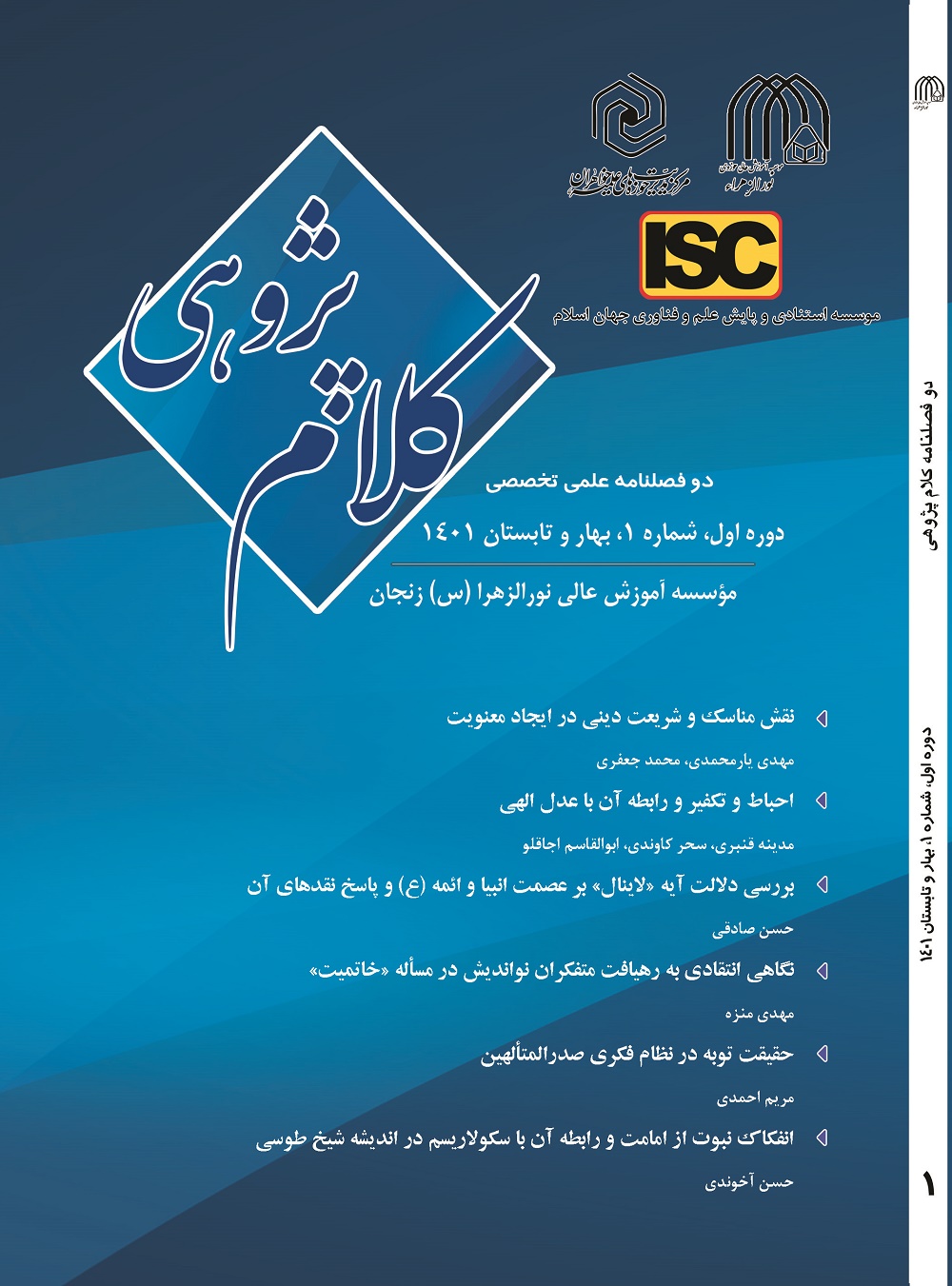نوع مقاله : مقاله پژوهشی
نویسنده
دکتری فلسفه و کلام اسلامی دانشگاه زنجان ، ایران
چکیده
بی شک یکی از ویژگی های کلام سنتی اسلامی، به خصوص پس از خواجه نصیر طوسی، استفاده ی متکلمان از منطق ارسطویی است. این موضوع مورد توجه برخی از پژوهشگران تاریخ علم کلام قرار گرفته است و سبب شده آنها به بررسی روند حضور منطق ارسطویی در کلام اسلامی بپردارند. اما علت شناسی این جریان مورد توجه واقع نشده و حداکثر به ذکر عامل تاریخی بسنده شده است. پژوهش حاضر از منظر زبان شناختی به بررسی علل گرایش متکلمان به منطق ارسطویی می پردازد تا پیش فرض های ذهنی متکلمان، برای گزینش منطق ارسطویی را روشن سازد. پیش فرض هایی در باب سعه و ضیق معنا، کیفیت حقیقت و یقین، قابلیت و ظرفیت زبان، اعتبار یا عدم اعتبار مجاز و همچنین اصالت وضوح یا ابهام. که می توان آن ها را تعیین کننده ترین پیش فرض ها در تمام موضوعات و مسائل کلامی دانست. مدل زبان شناسی سنتی در اثنای جریان نهضت ترجمه و حضور فلسفه ی یونان، وارد حوزه ی فکری متکلمان مسلمان شد. متکلمان با پایبندی به اصول مدل زبان شناسی سنتی و پذیرفتن پیش فرض های آن در باب معنا، یقین و زبان مسیری جز استفاده از منطق ارسطویی نداشتند چرا که بین مولفه های مدل زبان شناسی سنتی و اصول منطق ارسطویی هماهنگی کامل برقرار است. بنابراین مهمترین علت تثبیت منطق ارسطویی در کلام سنتی اسلامی را باید در مدل زبان شناسی متکلمان جستجو کرد.
کلیدواژهها
عنوان مقاله [English]
Study of the Linguistic Causes of Muslim Theologians' Tendency towards Aristotelian Logic
نویسنده [English]
- somayyeh ajalli
PhD in Philosophy and Islamic Theology, Zanjan University, Iran
چکیده [English]
Undoubtedly, one of the features of traditional Islamic theology, especially after Nasir al-Din al-Tusi, is the application of Aristotelian logic by theologians. This topic has called the attentions of researchers in the field of the history of theology to study application of Aristotelian logic in Islamic theology. However, the etiology of this trend has not been taken into account since it has concentrated only on historical factors. The present study examines the causes of theologians' tendency towards Aristotelian logic from a linguistic point of view, in order to clarify the mental presuppositions of theologians for applying Aristotelian logic. Presuppositions about the breadth and narrowness of meaning, the quality of truth and certainty, the ability and capacity of language, the validity or lack of legitimacy, as well as the originality of clarity or ambiguity, which all can be considered the most decisive presuppositions in all theological topics and issues. The traditional linguistics model has been introduced to the thought of Muslim theologians during the translation movement and the presence of Greek philosophy. Adhering to the principles of the traditional linguistics model and welcoming its presuppositions regarding meaning, certainty and language, the theologians had no choice but to apply Aristotelian logic since there is a wide-ranging harmony between the components of the traditional linguistics model and the principles of Aristotelian logic. Therefore, the most important reason for the stabilization of Aristotelian logic in traditional Islamic words should be sought in the linguistic model of theologians.
کلیدواژهها [English]
- linguistics
- Islamic theology
- Aristotelian logic
- traditional linguistics model
- meaning
- ابن خلدون، ابوزید عبدالرحمن، مقدمه، ترجمه محمد پروین گنابادی، چاپ هشتم، تهران، انتشارات علمی و فرهنگی، 1375ش.
- ارسطو، ارگانون، متافیزیک، ترجمه شرف الدین خراسانی، تهران، حکمت، ۱۳۶۶ش.
- استیور، دن آر، فلسفه زبان دینی، ترجمه ابوالفضل ساجدی، قم، نشر ادیان، 1393ش.
- سروش، عبدالکریم، قبض و بسط تئوریک شریعت، تهران، انتشارات صراط، چاپ سوم، ۱۳۷۳ش.
- سوسور، فردیناندو، دوره ی زبانشناسی عمومی، ترجمه کوروش صفوی، انتشارات هرمس، 1392ش.
- شهرستانی، محمد بن عبدالکریم، الملل و النحل، قم، الشریف الرضی، چاپ سوم، 1364ش.
- صدر، سید محمد باقر، الاسس المنطقیه للاستقراء، الطبعه الثانیه، قم، مرکز الابحاث و الدراسات التخصصیه للشهید صدر، 1426ق.
- طوسی، ابوجعفر محمدابن الحسن، الرسائل العشر، قم، مؤسسه نشر اسلامی، بی تا.
- غزالی، ابوحامد محمد، المنقذ من الضلال( اعترافات غزالی)، ترجمه زین الدین کیایی نژاد، تهران عطایی، 1349ش.
- غزالی، ابوحامد محمد، تهافت الفلاسفه، قاهره، 1903 م.
- غزالی، ابوحامد محمد، معیار العلم، قاهره، 1927م.
- غزالی، ابوحامد محمد، مقاصد الفلاسفه، قاهره، 1913م.
- فان اس، ژوف، ترجمه احمد آرام، ساختار منطقی علم کلام، مجله تحقیقات اسلامی، شماره 2و 3، زمستان و بهار 1366 و 1367 ش.
- کاپلستون، فردریک، تاریخ فلسفه ( یونان و روم)، ترجمه سید جلال الدین مجتبوی، تهران، سروش، 1375ش.
- لاهیجی، عبدالرزاق، شوارق الالهام فی شرح تجرید الکلام، چاپ اول، قم، مؤسسه امام صادق، 1425ق.
- لایکن، ویلیام جی، درآمدی به فلسفه زبان، ترجمه میثم امینی، تهران، انتشارات هرمس، چاپ سوم، 1395ش.
- مدکور، ابراهیم، منطق ارسطو نزد متکلمان اسلامی، ترجمه محمد خوانساری، مجله تحقیقات اسلامی، بی تا.
- مرزانی، حجتالله؛ اکبریان، رضا، سعیدی مهر، محمد، نبوی لطفالله، بررسی و تحلیل دیدگاه ارسطو دربارهی معرفت یقینی و فلسفه اولی آموزههای فلسفهی اسلامی، شماره ۱۹، پاییز و زمستان ۱۳۹۵، ۸۷ _ ۱۱۰.
- مظفر، محمدرضا،المنهج الجدید فی دراسات علم المنطق، نشر هاجر، 1383ش.
- نعمانی، شبلی، تاریخ علم کلام، ترجمه سید محمد تقی فخرداعی، تهران، چاپ اساطیر، چاپ اول، 1386ش.
- Macdonald,kalam,1936,danEI,t2,p176.

